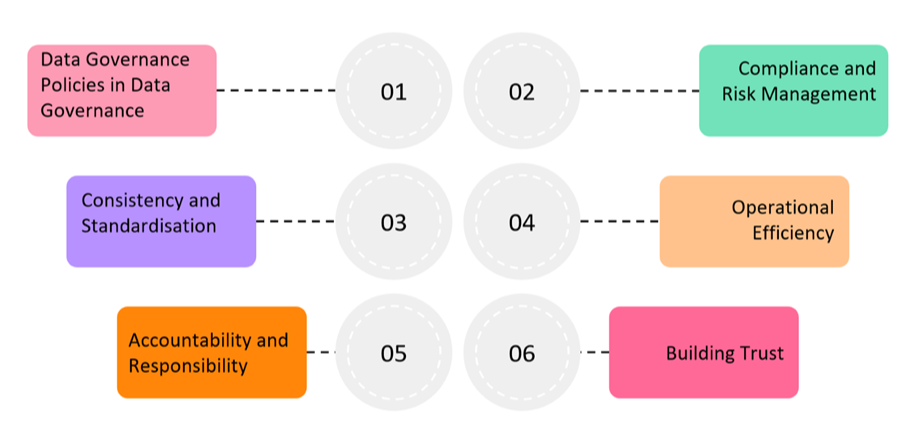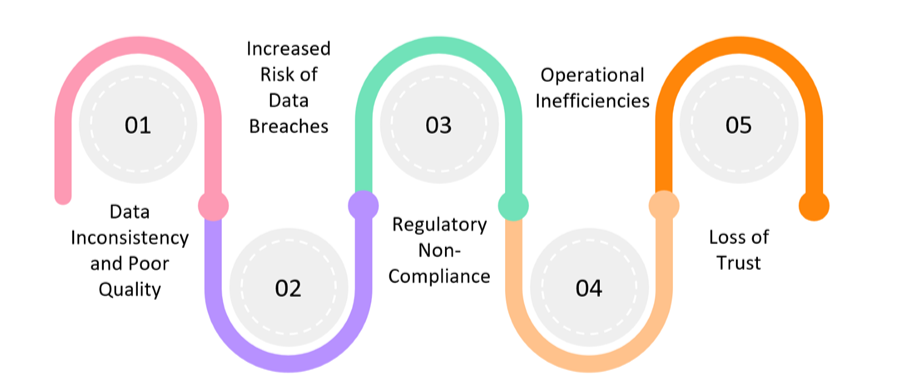
Navigating the risks of data governance
"Clear policies and effective implementation are essential for robust data governance", says Dr Dimitrios Marinos in his guest article. Organisations need to develop comprehensive policies, ensure proper employee training, leverage technology and foster a data-driven culture. This will mitigate risks such as data breaches, regulatory non-compliance and poor data quality, and support long-term business success and regulatory adherence.
Shortcuts:
Intro | Data governance policies | Ineffective implementation | Case study | Info-Events | Programme Information | Contact

Dr Dimitrios Marinos, our lecturer at HSLU, has deep expertise in artificial intelligence, big data analytics, digital transformation, AI ethics, data governance and more.
In the digital age, data has become one of the most valuable assets organisations have. However, the power of data can only be effectively harnessed through robust data governance. Data governance encompasses the processes, policies and standards that ensure data is managed, protected and used in a way that supports the organisation’s objectives while complying with relevant regulations. Two key challenges in this area are the lack of clear policies and ineffective implementation of data governance frameworks. These challenges can have a profound impact on an organisation’s ability to effectively manage its data, leading to various risks and missed opportunities.
The importance of clear data governance policies
Clear data governance policies are the foundation of any successful data management strategy. These policies define the rules and guidelines for how data should be handled, who is responsible for various data-related activities, and how compliance will be monitored and enforced. Without clear policies, organisations are vulnerable to inconsistent data management practices, increased risk of data breaches and potential non-compliance with regulatory requirements.

In the modern digital landscape, data is a critical asset that drives decision-making, operational efficiency and strategic planning. However, the power of data can only be effectively harnessed through robust data governance. At the heart of this governance are clear data governance policies, which are essential to ensure that data is managed, protected and used appropriately within an organisation.
Clear data governance policies establish a standardised approach to data management across the organisation. This standardisation is critical to maintaining data quality, integrity and reliability. When every department follows the same guidelines for collecting, storing, processing and sharing data, the likelihood of errors and inconsistencies is greatly reduced. Consistent data management practices ensure that data remains accurate and trustworthy, which is essential for making informed business decisions.
Well-defined policies clarify data management roles and responsibilities. They specify who is responsible for various data-related activities, from data creation and maintenance to security and compliance. This clarity is essential to ensure that data governance tasks are performed correctly and efficiently. It also facilitates accountability, as individuals and teams can be held accountable for their data handling actions. Without clear policies, accountability becomes ambiguous, leading to potential mismanagement and neglect.
In today’s regulatory environment, compliance with data protection laws such as the General Data Protection Regulation (GDPR) and the California Consumer Privacy Act (CCPA) is non-negotiable. Clear data governance policies help organisations navigate the complex landscape of regulatory requirements. These policies outline the necessary steps to ensure data is handled in accordance with regulatory standards, mitigating the risk of non-compliance. Non-compliance can result in severe penalties, legal consequences and reputational damage. In addition, clear policies help identify and manage the risks associated with data handling and ensure that data is protected from breaches and unauthorised access.
Clear data governance policies streamline data management processes, making them more efficient. By providing a roadmap for how data should be handled, these policies eliminate ambiguity and reduce the time and resources spent resolving data-related issues. Efficient data management improves overall operational efficiency, allowing organisations to focus on their core activities and strategic initiatives. In addition, clear policies facilitate better communication and collaboration between departments, as everyone adheres to the same policies and standards.
Trust is a critical component in any organisation’s relationship with its stakeholders, including customers, partners and regulators. Clear data governance policies demonstrate a commitment to privacy and ethical data management. This commitment fosters trust by reassuring stakeholders that their data is being handled responsibly and securely. At a time when data breaches and misuse are common concerns, having a transparent and well-enforced data governance policy is a significant advantage.
The consequences of ineffective implementation
Even with clear policies in place, their effectiveness depends on proper implementation. Ineffective implementation of data governance frameworks can negate the benefits of well-defined policies. This ineffectiveness can manifest itself in a number of ways, including inadequate training, lack of enforcement, insufficient resources and failure to integrate data governance into day-to-day operations.

Even when clear policies are in place, their effectiveness depends on proper implementation. Ineffective implementation of data governance frameworks can undermine the benefits of well-defined policies. This ineffectiveness can manifest itself in inadequate training, lack of enforcement, insufficient resources and failure to integrate data governance into day-to-day operations. The consequences of ineffective implementation are significant.
Inconsistently applied data governance policies lead to data inconsistencies and poor quality, undermining the reliability of data-driven decisions because stakeholders cannot trust the data they are using. Ineffective implementation also often leads to weak data security practices, exposing sensitive data to unauthorised users and increasing the risk of data breaches. Organisations may also fail to comply with data protection regulations if they do not effectively implement their data governance policies. Regulators expect organisations to have policies in place and to demonstrate compliance. Poor implementation of data governance frameworks can lead to operational inefficiencies if data governance tasks are not integrated into daily workflows, causing employees to spend excessive time on manual data management activities that take them away from their core responsibilities.
In addition, ineffective implementation can undermine confidence in the organisation’s data governance practices. Both internal and external stakeholders need to be confident that the organisation can effectively manage and protect data. Loss of trust can damage the organisation’s reputation and its relationships with customers, partners and regulators. Ensuring the effective implementation of data governance frameworks is therefore critical to maintaining data integrity, security, compliance, operational efficiency and stakeholder trust.
Case study: A real-world example
To illustrate the importance of clear policies and effective implementation, let’s consider a hypothetical case study of a multinational corporation, FictionAG. FictionAG operates in a variety of industries, including finance, healthcare and retail, each with its own data governance challenges. Initially, FictionAG faced significant data governance issues due to a lack of clear policies and ineffective implementation. Different departments followed different data management practices, leading to data inconsistencies, security vulnerabilities and regulatory compliance risks. Recognising the need for improvement, the company embarked on a comprehensive data governance overhaul.
FictionAG began by developing a clear and comprehensive data governance policy. They formed a cross-functional team to ensure that the policies addressed the unique needs of each department while maintaining overall consistency. The policies covered data quality standards, access controls, data security measures and compliance requirements. To ensure effective implementation, FictionAG invested in extensive training programmes for employees at all levels. They ran workshops and produced detailed documentation to help people understand and comply with the new policies. They also established a Data Governance Council with representatives from key departments to oversee policy enforcement and address any issues.
The company also allocated significant resources to support its data governance initiatives. They implemented advanced data management and security technologies, hired data governance specialists, and increased their budget for ongoing training and monitoring. By integrating data governance tasks into daily operations, FictionAG ensured that data management practices were aligned with its policies. They introduced regular data quality checks, access reviews and compliance audits to monitor adherence to policy and identify areas for improvement.
The results of FictionAG’s data governance overhaul were remarkable. They achieved greater consistency in data management practices, significantly reduced security vulnerabilities and ensured compliance with relevant regulations. In addition, the company fostered a culture that values data governance, resulting in improved data quality and increased stakeholder trust.
We would like to thank Dr Dimitrios Marinos for his dedication and for sharing these valuable insights.
DATA IS THE RESOURCE OF THE 21ST CENTURY!
REGISTER & JOIN US FOR A FREE ONLINE INFORMATION EVENT:
Monday, 4 November 2024, online, German
Friday, 29 November 2024, online, English
PROGRAMME INFO: MSc in Applied Information and Data Science
MORE FIELD REPORTS & EXPERIENCES: Professional portraits & study insights
FREQUENTLY ASKED QUESTIONS: FAQ


